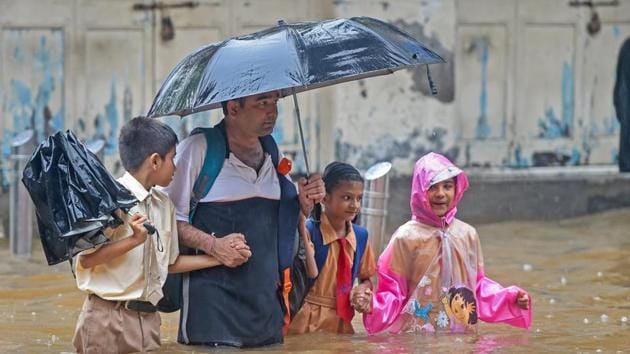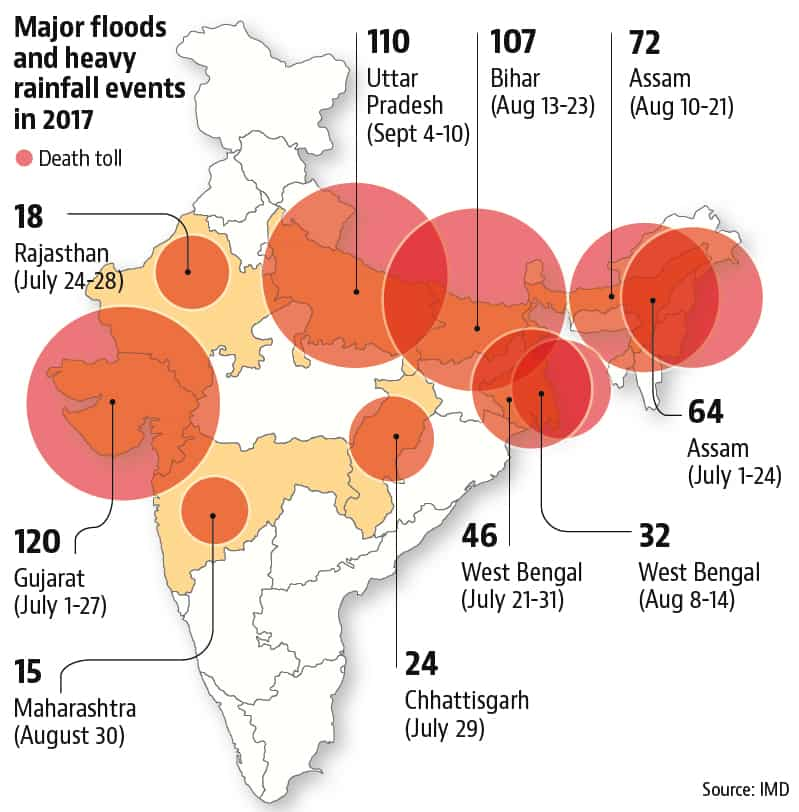As Earth warms up, expect intense, extreme rain leading to more flash floods
Short bursts of extreme precipitation do not reduce water stress or help recharge the water table. Instead, they often lead to flash floods.
Intense bursts of rain and continuous downpours have increased across towns and cities over the past few decades, with Bangalore receiving 35% of its annual average rainfall this year even before the onset of the monsoon. Last year, Ahmedabad (180mm in 24 hours) in 2017 and in 2005, Mumbai Metropolitan Region got flooded when it didn’t stop pouring (994 mm in a 24 hours).

“The number of days with heavy rainfall is increasing and the number of days with light rainfall is decreasing,” M Mohapatra, senior official at the India Meteorological Department (IMD), said. “The same amount rainfall is happening over a few days.”
The monsoon season is a dangerous and unsettling time in India, with most deaths reported from heavy rains and flooding in the four months of rain from June to September.
“Increasing trends in daily extreme precipitation in India have been observed during the recent 46 decades,” a recent paper said. “Moreover, urban areas in India have witnessed 47 eccentric precipitation extremes in the past, which have affected human lives and infrastructure.”
Between 1950 and 2017, India has reported 285 floods that have impacted 850 million people, left 19 million homeless and killed about 71,000. In the past decade, flood damage has led to losses of US $ 3 billion every year, according to the International Disaster Database.

But it is the short bursts of extreme precipitation that has scientists worried. Such events may boost the total amount of rainfall but they do not necessarily reduce water stress or significantly recharge the water table. On the contrary, much of the rain discharge is difficult to manage and often causes flash floods, which is detrimental to infrastructure.
Incidences of extreme rainfall, that precipitates flooding, are projected to increase as the planet warms. India is not just highly prone to weather-related disasters, its high population density and poor infrastructure also puts its people at higher risk. In the last two years alone, 25 million people have suffered impacts from heavy rains and floods and at least 2,000 people have died in these episodes.
In India, both large-scale floods from continuous heavy downpours and flash floods from sudden bursts of rain are expected to strike more often.
“A warming climate will cause more intense and more frequent extreme rain events,” Vimal Mishra, a climate scientist at IIT Gandhinagar, said. The increase in rainfall extremes is being driven by anthropogenic warming, Mishra and his colleagues said in a 2018 paper, noting that in the worst case scenario of unchecked greenhouse gas emissions, such events will increase significantly over south and central India by 2050.
“For cities, daily rainfall data is not that helpful, even 5-10 minutes of heavy rain can flood a city and pose a risk to the infrastructure,” Mishra said. Which is why the scientist is calling for improving understanding of sub-daily rainfall patterns that include rainfall spurts over less than 24 hours.”There isn’t enough focus on sub-daily rainfall events,” he said.
A paper by Mishra and his team showed that such short duration rainfall events that can trigger flash floods are even more sensitive to warming temperatures than 24-hour rainfall extremes. If there is an increase in average temperatures of 1 degree Celsius, there would be a greater increase in the events of sub-daily rainfall extremes than daily extremes.
The researchers found that the frequency of such events would increase by 20% if global temperature rises by 1.5 degrees Celsius and by 25% if they increase by 2 degrees Celsius over pre-industrial level.
Other researchers have reached similar conclusions about widespread extreme rains that causes flooding.
“We looked at the entire country and found a threefold increase in widespread extreme rain events over central India,” Roxy Mathew Koll, a climate scientist at Indian Institute of Tropical Meteorology, Pune, said. “Barring a few pockets of the country, the country overall is likely to see an increase in such events.”
Widespread rainfall events that occur over multiple days and cover a large swathe of area (running into thousands of square kms) are known to cause large-scale floods. The 2005 Maharashtra flood on July 26 and July 27, which led to over 1,000 deaths across the state and brought Mumbai to a standstill, is an example of this.
When temperature increases, it raises the moisture-holding capacity of the atmosphere. Scientists have reported an increase in moisture content in the atmosphere over the Indian subcontinent.
While this may sound like good news, the distribution of the rain over space and time muddies such a straightforward understanding. More rain is not a blessing when it is dumped over short periods of time.
It’s not just local warming, but region-wide warming is having an impact on India’s rainfall patterns, according to Koll.
“It is not the local temperatures, warming that is not even exactly over the Indian subcontinent has resulted in more moisture availability,” he explained. “ It is coming from the Arabian Sea, so warming elsewhere will also impact extreme rainfall events over Indian subcontinent.”
Get Current Updates on India News, Lok Sabha Election 2024 live, Infosys Q4 Results Live, Elections 2024, Election 2024 Date along with Latest News and Top Headlines from India and around the world.




